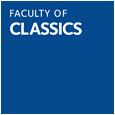First Public Examination: Honour Moderations in Classics

Honour Moderations in Classics is the first part of the multi-disciplinary Oxford Classics degree. Proceeding over the first five terms and culminating in a series of written examinations, it combines the study of literature, ancient history, philosophy, and the ancient languages. The students who proceed through ‘Mods’, as it is known, are able to make a series of detailed and informed choices about what they wish to do in the second half of the degree (known ‘Greats’), where they frequently choose to specialise in two of the three disciplines (literature, history, and philosophy).
We have recently reformed the structure of Mods so as to produce a more integrated student experience. Rather than being assigned into different courses with different course codes depending on your linguistic attainment prior to coming up to Oxford, we now stream students on the same course when they come up in Michaelmas Term, and devote differential amounts of (esp.) language teaching within the Faculty according to your experience and attainment levels.
If you are offering one ancient language at Mods (i.e. beginning your first ancient language at university), then you will sit six papers at that examination; if offering both (whether you studied both at school, or only one), then you will sit nine papers. They are as follows:
| I. Greek and Latin Literature Portfolio | |
|
II. Greek Literature: Commentary |
(only taken by candidates offering Greek) |
| III. Latin Literature: Commentary | (only taken by candidates offering Latin) |
| IV. Philosophy Special Subject | You choose one from: 1. Plato, Euthyphro and Meno 2. Cicero, De Finibus 1 3. Introduction to Logic |
| V. Ancient History, Archaeology or Philology Special Subject | You choose one from: 1. Athenian Revolutions, 411-403 BCE 2. Greeks and Persians 3. People and Politics in the Roman Republic, 58-52 BCE 4. Roman Imperialism in Gaul and Britain 5. Pots and Pictures: The Painted World of Greek Ceramics, 800-300 BCE 6. Archaeologies of Athens, 600-350 BCE 7. Rome: A World City 8. Life and Death on the Bay of Naples 9. Historical Linguistics and Comparative Philology |
| VI. Greek Prepared Translation | (only taken by candidates offering Greek) |
| VII. Latin Prepared Translation | (only taken by candidates offering Latin) |
| VIII. Greek Unprepared Translation and Language | (only taken by candidates offering Greek) |
| IX. Latin Unprepared Translation and Language | (only taken by candidates offering Latin) |
Papers I–III, VI and VIII, and VIII and IX are completely integrated, in that the same texts are studied from several different angles and to several different purposes: you use your experience of those texts in order to learn how to write essays in Paper I, how to write literary commentaries in Papers II and III, how to translate in Papers VI and VII, and how to write linguistic and grammatical commentaries on them in Papers IX and X. The subject you choose for philosophy (Paper IV) and for ancient history (Paper V) will also provide texts for translation and linguistic commentary in Papers VI–IX. This is what we mean by a more integrated student experience.
The texts and subjects you choose are exciting, wide-ranging, and intellectually challenging. They combine the recognised superstars of the disciplines – Homer and Euripides from Greek literature, Catullus and Ovid from Latin literature, Plato from philosophy, Thucydides, Herodotos, and Tacitus in ancient history – with authors whose prominence in the public imagination has varied over time – Lucian in Greek literature, Cicero in philosophy – so as to give a wider and fully representative view of the huge range, historical, literary, and philosophical, that the ancient world has to offer.
Please note that changes may be made to course syllabuses from year to year, and that not all papers may be available in any given year.



